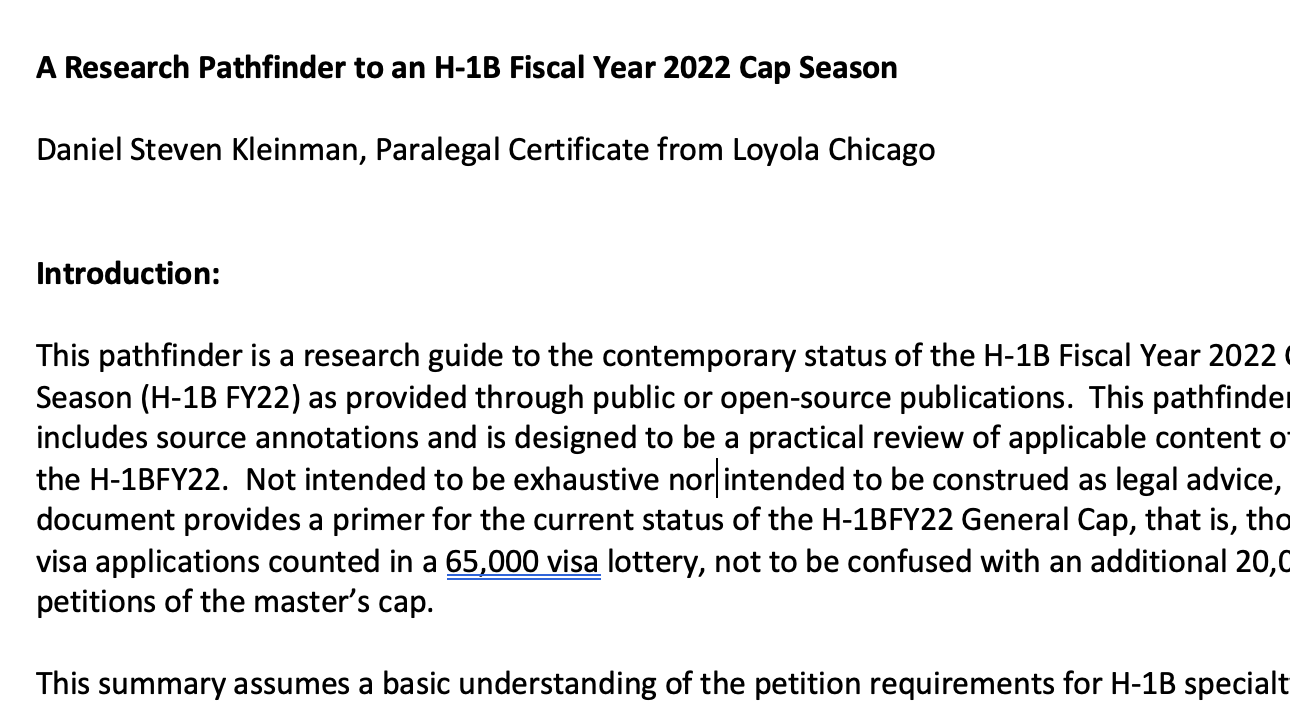Daniel Steven Kleinman, Paralegal Certificate from Loyola Chicago
A Summary to an H-1B Fiscal Year 2022 Cap Season
Introduction:
This summary is a guide to the contemporary status of the H-1B Fiscal Year 2022 Cap Season (H-1B FY22) as provided through public or open-source publications. This pathfinder includes annotations and is designed to be a practical review of applicable content of the H-1BFY22. Not intended to be exhaustive nor intended to be construed as legal advice, this document provides a refresher for the current status of the H-1BFY22 General Cap, that is, those visa applications counted in a 65,000 visa lottery, not to be confused with an additional 20,000 petitions of the master’s cap.
This overview assumes a basic understanding of the petition requirements for H-1B, the nonimmigrant classification that can be given to those who perform a speciality occupation (e.g. an assertion of education attainment equivalent to an U.S. Bachelor’s, the description of the complex job requiring the specialty, and the accompanying Form ETA-9035/9035E).
212(F) Freeze Announced:
On April 22, 2020, the Trump administration used 212(f) of the Immigration and Nationality Act to suspend the entry of almost all types of immigrants, including employment-based immigrants, in a proclamation. Despite respite in Gomez v. Trump, 2020, 1:20-cv-01419 ( D.D.C. ), the court upheld the proclamation itself as legal in suspending the entry of employment-based immigration via section 212(F).
Section 212(F) can be seen through the Foreign Affairs Manual (FAM) of the State Department, which outlines through 9 FAM 302.1 the authority of the President of the United States to Block Property and Entry into the United States for case of national safety. It can easily be noted that the manual opens with citations of the Cuban Liberty and Democratic Solidarity Act and the Iran Threat Reduction Act of 2012.
Through citing the powers of 212(F), the Trump Administration enforces a freeze on H-1B visas.
On January 1, 2021, President Trump opened the new year with an edict from his administration to continue its halt of new H-1B visas until March 31, 2021. This initiative by the Trump administration is consistent with its previous actions toward the visa program in the time of the Covid-19 pandemic closures. This most recent freeze, until March 31, 2021, comes on the heels of similar freezes from June 22, 2020, and further back to April 22, 2020.
212(F) Future:
The significance of the most recent freeze is its timeline: USCIS has routinely relied on an April 1 opening for its lottery registration. It is that near conflation of dates between March 31 and April 1 that creates the organizational imposition.
The invocation of 212(F) is declared by the President and its administration, and the Secretary of State and its Department of State is an Executive Office and Appointee, as established in Article II, Section 2, of the United States Constitution.
Incoming President Elect Biden has declared intent to nominate Antony Blinken to the Secretary of State role in 2021. Blinken has visited India to build policy relations under previous administrations, including in the State Department under Presidents Clinton and Obama. This is significant as many as 71% of H-1B visa recipients have been Foreign Nationals from India.
Regarding the Electronic Registration
The H-1B Electronic Registration process, as announced on December 6, 2019, was implemented for the first time for FY21.
The new web-based portal provides input for the required information of the company, role, and beneficiary as needed for submission into the lottery. As described above and through the USCIS H-1B Electronic Registration Process, Attorneys or Accredited Representatives may create uploads of as many as 250 beneficiaries at a time for $10 fee per beneficiary and may continue to repeat that process. The portal allows for a .csv download to review for accidental duplicate beneficiaries or other errors before submission.
In an April 1, 2020, press release announcing the open date for H-1B cap-subject petitions of that same date, USICS Deputy Director for Policy Joseph Edlow stated: “The new H-1B electronic registration system has been an overall success…. The positive feedback received by users of the H-1B registration system, the limited amount of technical issues experienced during the registration period, and the ability to immediately respond to questions from registrants, was the result of a comprehensive effort developed over the course of more than a year.”
Not disputing Edlow, the New York based career service for information and technology professionals, Dice.com, published on its own blog days later, April 7, 2020, that this new process benefits larger registrants. The site closes this blog post by highlighting that the H-1B approval rate, and its RFE approval rate, increased slightly, albeit denials are still more prevalent than were during previous administrations.
